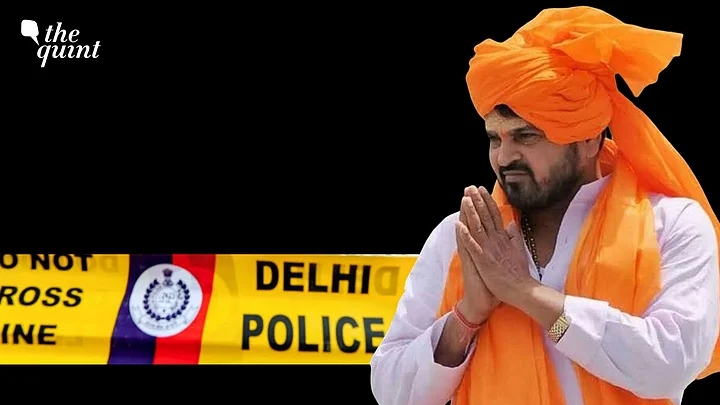“A woman will have to put her career, reputation, life, and family peace at risk if she wants to pursue her case, while a man loses nothing,” Advocate Vrinda Grover told The News Minute, as reports of a minor having withdrawn her sexual harassment complaint against BJP MP Brij Bhushan Singh swirled around the internet.
The reports claimed that the minor had “after alleging sexual harassment and stalking against (the) Wrestling Federation of India (WFI) president…in two statements, one before the police and another before a magistrate…withdrawn her allegations.”
Simultaneously, however, the minor’s father dubbed such claims “completely fake” and told The Print:
“I have not withdrawn the complaint. I have taken the decision to fight it out and I will.”
Wading through the contradictory reportage, Grover pointed out to TNM:
“No complainant can simply give a statement contradicting their previous one and take back their complaint or allegations.”
Simply put, when it comes to the POCSO (Protection of Children from Sexual Offences) case against Brij Bhushan Singh — it does not matter much whether the minor has given a statement opposing her original statement or not.
But, why is that?
“Complaints in serious (cognizable) crimes cannot be withdrawn. The case can only be quashed by a court of law. So even if the minor’s guardian supposedly withdraws the charges, the police will have to Investigate. More so under POCSO.”Yashaswini Basu, Bengaluru-based lawyer
So, in case of contradictory statements made before a magistrate, what really happens?
“All (Section) 164 statements carry evidentiary value because they are made to a magistrate and signed by the maker of the statement. But such statements still have to be examined before a criminal trial court for their veracity to be established,” Vrinda Grover told The News Minute.
Meanwhile Yashaswini Basu, in conversation with The Quint, pointed out that while statements made before the police or the magistrate are not considered substantial evidence (ie evidence carrying enough substance and consequence),“ they can however be relied upon in courts during trials and cross examination to either corroborate or contradict a witness.”
“So in this case, irrespective of whether the complaint has been withdrawn or not, the police will have to continue their investigation because the offences in the complaints are all cognizable,” Basu reiterated.
And can a fresh statement lead to the FIR against Brij Bhushan Singh being thrown out?
If during the quashing of FIR-related proceedings, post examination of all the available evidence, the court arrives at the conclusion that a case is not prima facie made out, then yes the court may throw the FIR out.
“But the minor's statement cannot be the sole ground on which any order may be passed,” Basu added.
Why the Minor Deserves Better
As pointed out by Grover, such reports claiming “withdrawal” of charges lead to mistrust among the protesting women wrestlers. Further, they create an assumption in the mind of the public that “something fishy” is underway.
And even if, by some stretch of imagination they are true: “When every signal has been given that Brij Bhushan will be protected, how can we expect a minor survivor to withstand the pressure it exerts on her and her family?”
Forget men in power, more often than not, even significantly less powerful people get away with such offences.
According to the National Family Health Survey-5 (2019-21), only 14% of women who have experienced any type of physical or sexual violence came out and sought help. In 2018, a Mint report comparing (then available) National Family Health Survey (NFHS) data with that of the NCRB, said that approximately 99% of sexual assault cases went unreported.
As pointed out here, the reason for this could range anywhere from fear of stigma, shame, intimidation and blame, to difficulty in filing a police report.
Having said that, the stakes are generally higher when the accused is a high government functionary.
The two FIRs (including the one under POCSO) were registered against Brij Bhushan Singh only after the pleas for them reached the top court. And even then, the Delhi Police had initially told the court that they wanted to probe the complaints first — this despite the fact that, barring specific circumstances, the law makes it mandatory for the police to register an FIR on receiving information about commission of a cognizable offence. (More here).
More recently, on 28 May, while the new ‘temple of democracy’ was being inaugurated in the national capital, the subjects of this democracy were witness to a violent uprooting of the wrestlers’ protest against Singh. An FIR was also registered against the protesting wrestlers under several sections of the IPC as well as Prevention of Damage to Public Property Act.
While the case against Singh is yet to be proven in a court of law (the probe being underway), it is also unfair to expect a child to withstand the surmounting pressure. And if she somehow does, her ordeal deserves better than inconsistent reportage.
Like Basu and Grover have said, her subsequent statements (changed or unchanged) do not even mean all that much with regard to the overarching POCSO case.
“Yes, I have the spirit to fight. I am fighting it, but till when can I keep going? This experience has completely drained me,” the minor’s father was quoted in a Print report, dated 5 June.
